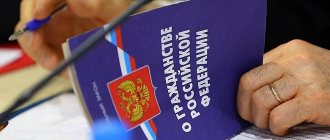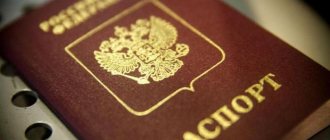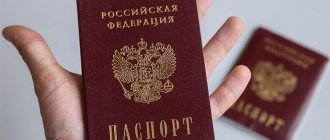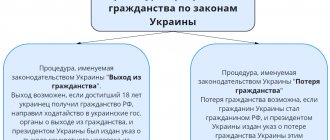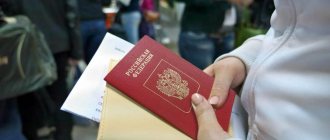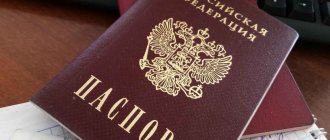Many residents of the former republics of the USSR want to obtain Russian citizenship. There are two ways to obtain Russian citizenship: simplified and standard. The President of the Russian Federation signed a new law on simplified acquisition of Russian citizenship, which came into force on July 24, 2020.
Legal agency “Migron” https://migron.ru/ is a specialized migration agency for citizens of Ukraine, Belarus, Kazakhstan and other foreign citizens in Russia. We will help you translate documents, pass exams, pass a medical examination, as well as obtain a temporary residence permit, residence permit, RN and Russian citizenship on a turnkey basis from the very beginning until receiving a passport. Fast, without queues and with a guarantee of results.
Over 7 years of work, we have helped more than 3,500 foreign citizens obtain Russian citizenship. Address: Moscow, Kurskaya metro station, st. Zemlyanoy Val, building 7, office 219 Phone: + 7 (495) 118 33 71 Find out how to obtain Russian citizenship using a simplified procedure on the website migron.ru.
New law on simplified acquisition of Russian citizenship in 2021
On April 17, 2021, Federal Law No. 134 was adopted by the State Duma and approved by the Council of Federation on amendments to Federal Law No. 62, which significantly simplifies the procedure for obtaining Russian citizenship. You can read it on the official website https://publication.pravo.gov.ru
All foreign citizens, without exception, are no longer required to renounce their existing citizenship and, for some, to confirm a legal source of income. The amendments came into force on July 24, 2020.
The procedure for obtaining citizenship under a simplified scheme in 2021 is in accordance with the above changes.
Grounds for acquiring citizenship under a simplified procedure
Citizens of other countries and stateless persons can submit an application to acquire Russian citizenship in a simplified manner. But it is worth considering that they have the right to do this if there is one of the grounds given in Art. 14 FZ-62.
An important feature of the simplified scheme is the rapid consideration of applications. If in the general procedure the period is 1 year, then in the accelerated procedure it is 3 months.
According to the new simplified procedure for obtaining Russian citizenship, the following categories of applicants no longer need to comply with the requirement of a 5-year period of residence in Russia from the date of issuance of a residence permit, renounce their existing citizenship and confirm a legal source of income:
- Born on the territory of the RSFSR and having citizenship of the former USSR.
- Married for at least 3 years to a citizen of the Russian Federation living in the territory of the Russian Federation.
- Parents of capable adult children with Russian citizenship.
- Having a child from a citizen of the Russian Federation. But in this case there are some nuances. A parent who is a citizen of the Russian Federation must be deprived of parental rights, be deceased, incompetent or missing. If the parent is healthy and is not officially married, then there are no grounds for acquiring Russian citizenship under this scheme.
- Having parents or one parent with the status of a citizen of the Russian Federation. There are also requirements for parents: according to the law, they are required to have permanent registration within Russia.
- Persons with professional education and work experience of at least 1 year. But in this situation, several aspects need to be taken into account: vocational education was received on the territory of the Russian Federation after July 1, 2002, the university must have state accreditation, and during the period of employment, insurance contributions were deducted to the Pension Fund of the Russian Federation.
- Having the status of an individual entrepreneur who has been operating for at least three years. But in this case there is also a nuance. If the annual profit of an entrepreneur is less than 10 million rubles, then he does not have the right to apply for Russian citizenship.
- Possessing investor status. But investors have their own requirements: the amount of authorized capital cannot be less than 100 million rubles, and annual tax deductions cannot be less than 6 million rubles.
- For native speakers of Russian (NRN).
- Participants of the State Program for the Resettlement of Compatriots.
According to Federal Law No. 134, stateless adults who previously had USSR citizenship and are permanently residing in the territory of the former Soviet republics, but have not obtained another citizenship, are also entitled to apply for Russian citizenship. Moreover, for this category of applicants it is not necessary to confirm a legal source of income for living in Russia.
Federal Law-134 identified two more categories of foreign citizens and stateless persons who have the right to apply for admission to Russian citizenship in a simplified manner:
- Those who have common children married to citizens of the Russian Federation living in the territory of the Russian Federation, if they have a temporary residence permit or residence permit.
- Are citizens of the Republic of Moldova, the Republic of Belarus, the Republic of Kazakhstan and Ukraine.
The application form for obtaining Russian citizenship in a simplified manner can be downloaded here.
A stateless person or stateless person can apply for Russian citizenship under this scheme both within the Russian Federation and abroad. That is, he has the right to submit documents even at the diplomatic mission of the Russian Federation, which is located in any country in the world.
Soviet stateless person's certificate
Video: forgiven procedure for obtaining Russian citizenship
Find out from the video:
- who applies for obtaining Russian citizenship in a simplified manner.
Innovations 2020-2021
To acquire Russian citizenship, you first need to obtain a residence permit in this country. But the law says that even without a residence permit you can apply for a Russian citizen passport.
This “privilege” is available:
- foreign citizens born in the RSFSR and who previously had USSR citizenship;
- minor foreign citizens who have parents with a residence permit;
- foreign citizens under 18 years of age who receive a residence permit together with parents (adoptive parents, guardians, trustees) with foreign citizenship;
- foreign citizens with parents (adoptive parents, guardians, trustees) or children with Russian citizenship permanently residing in the Russian Federation;
- adult foreign citizens recognized as incompetent or limited in legal capacity, receiving a residence permit together with parents (adoptive parents, guardians, trustees) with foreign citizenship;
- foreign citizens who have reached 18 years of age, who are recognized as incompetent or limited in legal capacity and whose parents (adoptive parents, guardians, trustees) are foreign citizens with a residence permit;
- foreign citizens who themselves or their relative in a direct ascending line, spouse, or adoptive parent were subjected to illegal deportation from the Crimean Autonomous Soviet Socialist Republic, a relative in a direct descending line, spouse or adopted children of these foreign citizens if they have a certificate of rehabilitation;
- highly qualified employees (HQS) and members of their families;
- persons living in the Russian Federation whose Russian citizenship has been terminated;
- persons in respect of whom the decision to acquire Russian citizenship was cancelled;
- citizens of the Republic of Belarus;
- native speakers of Russian (NRY);
- participants of the State program for the resettlement of compatriots in the Russian Federation;
- foreign citizens with a document of higher education and qualifications with honors. Education must be obtained full-time at an educational institution of the Russian Federation with state accreditation;
- persons specified in Part 1, Part 3 of Art. 41.1 of Federal Law No. 62-FZ of May 31, 2002 “On Citizenship of the Russian Federation”.
What privileges did the new Federal Law 134-FZ provide for each category of foreign citizens and stateless persons?
For stateless persons (LSP):
- the condition on the need to reside on the territory of the Russian Federation for a 5-year period from the date of issuance of the residence permit is canceled;
- You no longer need to confirm a legal source of funds for living in the Russian Federation when applying for Russian citizenship.
The above category includes those persons who have reached the age of majority, are legally capable, previously had citizenship of the former USSR, have lived and are living in states that were part of the USSR, but have not received citizenship of these states.
For foreign citizens and stateless persons (LSP) married to citizens of the Russian Federation:
- you no longer need to confirm a legal source of funds for living in the Russian Federation when applying for Russian citizenship;
- a requirement is introduced that a spouse who is a citizen of the Russian Federation must reside on the territory of the Russian Federation.
For foreign citizens and stateless persons (LSP) who have a capable son or daughter, who have reached the age of majority and are citizens of the Russian Federation:
- the requirement that such persons have a disability is cancelled;
- There is no requirement to confirm a legal source of funds for living in the Russian Federation when applying for Russian citizenship.
For foreign citizens and stateless persons who, after July 1, 2002, received professional education in state-accredited educational programs in Russian educational organizations located on the territory of the Russian Federation:
- the period for carrying out labor activity in the Russian Federation after graduating from an educational organization until the day of applying for admission to Russian citizenship has been reduced from 3 years to 1 year;
- There is no requirement to confirm a legal source of funds for living in the Russian Federation when applying for Russian citizenship.
For foreign citizens and stateless persons who have at least one parent who is a citizen of the Russian Federation and resides on the territory of the Russian Federation:
- There is no requirement to confirm a legal source of funds for living in the Russian Federation when applying for Russian citizenship.
Important: if previously such persons could apply for admission to Russian citizenship at the Russian Federation Consular Office located outside the Russian Federation, now they can do this ONLY on the territory of the Russian Federation.
A new category of foreign citizens who have the right to apply for Russian citizenship
A new category of foreign citizens is being introduced who have the right to apply for Russian citizenship in a simplified manner. These are foreign citizens and stateless persons (LSPs) who are married to citizens of the Russian Federation and have common children in such marriages:
- such persons have the right to apply for admission to Russian citizenship both in the presence of a temporary residence permit and in the presence of a residence permit, however, for this category there is no requirement to live in a marriage with a citizen of the Russian Federation for a 3-year period;
- there is no need to confirm a legal source of funds for living in the Russian Federation when applying for Russian citizenship;
- but for this category there is a requirement that the spouse, who is a citizen of the Russian Federation, must reside on the territory of the Russian Federation.
Citizens of the Republic of Belarus , the Republic of Kazakhstan, the Republic of Moldova and Ukraine are also added to the new category of foreign citizens who have the right to apply for Russian citizenship in a simplified manner
- there is no requirement to reside on the territory of the Russian Federation for a period of 5 years from the date of issuance of the residence permit;
- There is no need to confirm a legal source of funds for living in the Russian Federation when applying for Russian citizenship.
Is there a quota for citizenship of the Russian Federation?
There are no quotas for Russian citizenship. But there is a current quota for temporary residence permits (TRP).
A temporary residence permit allows a foreigner to legally live and work in Russia. Most often it is issued for a period of 3 years, but it can also be issued for another period.
For example, if a minor receives a temporary residence permit, the permit will be given for the same period as that of his parent, if a military person - it will be given for the period of military service.
A temporary residence permit without a quota can be obtained by a foreigner who:
- Born in the RSFSR and was a citizen of the USSR,
- They have a child or parent who is a citizen of the Russian Federation living in Russia.
- A minor who has a foreign parent living in the Russian Federation.
- Receives a residence permit together with a foreign parent.
- Recognized as a native speaker of Russian.
- He was subjected to illegal deportation from the territory of the Crimean Autonomous Soviet Socialist Republic.
- He is a highly qualified specialist.
- Works for more than six months in a profession from a special list.
- Received full-time education at a Russian state university.
- He is a participant in the state program for the resettlement of compatriots.
- He is married to a Russian citizen and permanently resides in Russia.
If a foreigner does not meet one of these conditions, he can obtain a temporary residence permit under a quota.
Every year, government authorities decide how many quotas to allocate this year and how to distribute them among regions. For example, in 2020, 60,300 quotas were allocated for temporary residence in Russia. Of these, 2000 went to Moscow, 1500 to St. Petersburg. Quotas fill very quickly, so it is best to apply at the beginning of the year.
Legal assistance in obtaining temporary residence permit, residence permit and citizenship
Migron, a specialized legal agency for Ukrainian citizens in Russia, can help you obtain:
- RVP,
- residence permit,
- AE status,
- Russian citizenship “turnkey” from the very beginning until receiving a passport,
Over 7 years of work, we have helped more than 3,500 foreign citizens obtain Russian citizenship.
- Address: Moscow, Kurskaya metro station, st. Zemlyanoy Val, building 7, office 219
- telephone: +
- Find out how to obtain Russian citizenship on the website migron.ru.
The procedure for obtaining citizenship according to a simplified scheme
Registration of citizenship is carried out in the Main Directorate for Migration of the Ministry of Internal Affairs of the Russian Federation, namely in one of its territorial divisions.
List of required documents
It is necessary for the employees of this organization to submit a package of documents, which includes:
- Statement. The application form for obtaining Russian citizenship and a sample of filling out the application can be downloaded here.
- One of the passports: internal civil, foreign, diplomatic, service, sailor's passport.
- residence permit;
- A document confirming knowledge of the Russian language.
- Receipt for payment of state duty in the amount of 3,500 rubles.
- A document confirming the change of surname (if necessary, in connection with a change of surname due to marriage).
- A document that confirms the existence of grounds for obtaining Russian citizenship under a simplified scheme.
- Photos.
Obtaining Russian citizenship in a simplified manner
The basis for applying the simplified procedure may be:
- Passport of a citizen of the USSR.
- Certificate of birth on the territory of the RSFSR.
- A document confirming the change of your passport to a stateless document.
- Marriage certificate.
- A document that indicates the incapacity of an applicant for a Russian passport. Such documents can be certificates of disability or retirement.
- Birth certificate of a child, one of whose parents is a citizen of the Russian Federation.
- Confirmed AE status.
- Certificate of participant in the State Program for the Resettlement of Compatriots.
- Having permanent registration in the LPR and DPR, as well as an identity card issued by the Ministry of Internal Affairs of one of the republics and containing this information.
The decision to grant citizenship must be approved by the president.
This video explains in detail whether it is worth applying for citizenship yourself or whether it is better to seek help from professional lawyers.
Requirements for the correct execution of documents
When submitting documents, you must comply with the following basic requirements:
- All documents are provided together in the original, but they are not submitted to the territorial body of the Main Directorate for Migration of the Ministry of Internal Affairs of the Russian Federation. Employees of this organization compare the original documents with their notarized copies and return them to the applicants.
- Documents in a foreign language must be translated into Russian and have notarization.
- Foreign documents must have an apostille.
Example of an apostilled document
How to become a citizen of the Russian Federation
Most of the residents of our country became citizens of Russia automatically, that is, as a result of being born on its territory from Russian citizens. Those who are less fortunate have to go through a multi-stage and lengthy procedure to become its citizens.
In general, you need to go through the following steps:
- Arrive in Russia legally and register with the migration authorities.
- Apply for a temporary residence permit (TRP). The document is issued for three years, but after a year you can apply for the next document, called a residence permit (RP).
- Applying for a residence permit and its registration. After five years of residence in the Russian Federation, on the basis of this document, you can apply for a desire to become a citizen of the Russian Federation.
- Applying for Russian citizenship and acquiring citizen status.
At all stages, except the first, it is necessary to pass an exam on knowledge of the Russian language and the fundamentals of the history of Russia and its laws. In addition, you will have to undergo a medical examination to ensure that there are no diseases dangerous to others and go through a lot of other bureaucratic procedures. At every stage you can get rejected. Taking into account the time established by law for considering the issue and making a decision at each stage, admission to Russian citizenship on a general basis takes about eight years.
About dual citizenship
In accordance with Art. 6 of Federal Law No. 62-FZ of May 31, 2002, a citizen of the Russian Federation, if he has another citizenship, is considered by the Russian Federation only as citizens of the Russian Federation. There are exceptions to this when an international treaty or federal law provides otherwise.
An international treaty on dual citizenship was concluded between the Russian Federation and the Republic of Tajikistan and allows citizens of the Russian Federation to acquire citizenship of another country without losing their own.
Having a second citizenship in Russia is not prohibited, but its availability must be promptly notified to the territorial body of the Main Directorate for Migration of the Ministry of Internal Affairs of the Russian Federation.
Process of registration and receipt of a passport
Applicants should submit their application and documents to the Main Migration Department of the Ministry of Internal Affairs. Its offices operate in almost every police department.
You will have to wait a maximum of six months to receive a passport with a double-headed eagle. Sometimes the process can be completed faster, but provided that the documentation is properly prepared and the workload of immigration officials is light.
Obtaining a completed citizenship document is provided at the above-mentioned migration service. The newly minted citizen must take an oath of allegiance to his new homeland.
The amount of the state duty is regulated by Article 333.28 of the Tax Code. Much depends on the conditions for obtaining citizenship. The average state duty is 3.5 thousand rubles. The cost of producing the document is 300 rubles.
A GUVM office can be found at almost every police station.
Registration of Russian citizenship for Ukrainians
With the entry into force of Federal Law No. 257-FZ of September 2, 2019, the procedure for obtaining Russian citizenship has become significantly simplified for citizens of Ukraine, including. The grounds were supplemented under which citizens of such a country have the right to obtain a temporary residence permit outside the quota system or to bypass such a procedure altogether.
According to the innovations, citizens of Ukraine who have permanently resided in this country, been recognized as refugees, or have received temporary asylum in the Russian Federation are now entitled to apply for a temporary residence permit in a simplified manner.
The grounds for obtaining a temporary residence permit in a simplified manner are specified in Part 3 of Art. 6 of the Federal Law “On the Legal Status of Foreign Citizens in the Russian Federation” dated July 25, 2002 N 115-FZ.
These include:
- those who have grounds for obtaining a residence permit in a simplified manner;
- who has not reached the age of eighteen years and whose parent (adoptive parent, guardian, trustee) is a foreign citizen and temporarily resides in the Russian Federation - for the period of temporary residence of his parent (adoptive parent, guardian, trustee);
- under the age of eighteen years, receiving a temporary residence permit together with a parent (adoptive parent, guardian, trustee) - a foreign citizen;
- married to a citizen of the Russian Federation who has a place of residence in the Russian Federation - in the subject of the Russian Federation in which the place of residence of the citizen of the Russian Federation who is his spouse is located;
- who has reached the age of eighteen years, in accordance with the legislation of a foreign state, recognized as incompetent or limited in legal capacity, receiving a temporary residence permit together with a parent (adoptive parent, guardian, trustee) - a foreign citizen;
- who has reached the age of eighteen years, in accordance with the legislation of a foreign state is recognized as incompetent or limited in legal capacity and whose parent (adoptive parent, guardian, trustee) is a foreign citizen and temporarily resides in the Russian Federation - for the period of temporary residence of his parent (adoptive parent, guardian, trustee);
- who has made investments in the Russian Federation in the amount established by the Government of the Russian Federation;
- for those entering military service - for the duration of his military service;
- who is a participant in the State program to assist the voluntary resettlement to the Russian Federation of compatriots living abroad, and members of his family moving with him to the Russian Federation;
- who is a citizen of a state that was part of the USSR and has received professional education in a state educational organization of higher education, a state professional educational organization or a state scientific organization located on the territory of the Russian Federation, according to educational programs that have state accreditation;
- who is a citizen of Ukraine or a stateless person who has permanently resided on the territory of Ukraine, has been recognized as a refugee, or has received temporary asylum in the territory of the Russian Federation;
- relocating to the Russian Federation for permanent residence in accordance with international treaties of the Russian Federation on regulating the resettlement process and protecting the rights of migrants.
On May 1, 2021, the President of Russia signed a Decree according to which the following are now entitled to apply for Russian citizenship in a simplified manner:
- Ukrainians who were born and permanently resided in the territory of Crimea before March 18, 2014, but left it, as well as their close relatives (children, parents, spouses).
- Stateless persons who were also born and lived in Crimea before March 18, 2014, but subsequently left it, and their relatives.
- Stateless persons and citizens of Ukraine and their relatives who resided permanently in the LPR and DPR at the time of 04/27/2014 and 04/7/2014, respectively, if they have a temporary residence permit, residence permit, refugee certificate or certificate of a State program participant.
- Foreigners and stateless persons who themselves or their relatives were deported from the Crimean Autonomous Soviet Socialist Republic.
- Residents of the LPR and DPR, if they have permanent registration on the territory of the republics.
According to the new amendments introduced on April 17, 2021, citizens of Ukraine have the right to obtain Russian citizenship through a simplified procedure.
Video: review of participation in the compatriots resettlement program
Find out from the video:
- what is this project for?
- how and where to apply for participation in the program;
- what benefits are provided for participants.
The general procedure for acquiring Russian citizenship provides for mandatory residence in the Russian Federation for five years from the date of issuance of a residence permit. The simplified scheme for citizens of Ukraine excludes such a requirement.
Who will not be given citizenship
To become a Russian citizen in the general manner, you first need to obtain a TRP (temporary residence permit), then a residence permit. Only then will you have the right to apply for citizenship. If this sequence is violated, your application will be refused. Also, the application will not be accepted if an incomplete set of documents is submitted along with it. In addition, applicants who:
- They advocate changes to the Constitution of the Russian Federation or create a threat to the security of the Russian Federation. This may include attempts to violently seize power, an attack on the life of a politician, or calls for these actions.
- Participate or have participated in armed conflicts, participated in terrorist attacks and their preparation in relation to citizens of the Russian Federation or representative offices of the country abroad.
- Participate or have participated in extremist activities, disclosure of state secrets, military mutiny or espionage.
- Restricted entry into Russia due to the fact that they were subjected to deportation or expulsion from the country.
- They provided false information about themselves and submitted false documents.
- Serve in law enforcement, army or security agencies of another state.
- Have an outstanding or unexpunged conviction for intentional crimes.
- Criminally prosecuted for crimes.
- Convicted and in prison.
- They refuse to take the oath.
General requirements
In order for a resident of another country - a former republic of the USSR to be granted citizenship in a simplified manner, he, according to the law, must meet the following requirements:
- Have a residence permit. It is worth noting that this document allows you to live on the territory of the Russian Federation on legal grounds for an unlimited amount of time, but if you have it, you cannot stay outside the Russian Federation for more than 6 months in total during a calendar year, since this will be grounds for cancellation of the residence permit.
- Be registered in the state. This does not mean temporary, but permanent registration on the territory of the Russian Federation.
- Have the means to live in this country. It is worth noting that the source of income must be legal and must be documented.
- Have a good command of the Russian language.
Regarding language proficiency, it is worth noting that the applicant for citizenship must be fluent in the Russian language, both orally and in writing. This means that the applicant must be able to read, write and communicate fluently in that language.
According to the norms of Federal Law No. 62, this rule applies only to female representatives under 60 years of age and male representatives under 65 years of age. Also, this requirement is not imposed on disabled people of group 1.
Legislative framework in force in 2021: laws, decrees, amendments
The procedure for obtaining citizenship in a simplified manner is regulated by Federal Law No. 62. Article 14 of this Law describes a simplified procedure for obtaining citizenship, as well as the reasons for acquiring citizenship under this scheme.
Latest changes in migration legislation
- On March 18, 2021, Federal Law No. 58 came into force, canceling the requirement to undergo an interview by a special commission when confirming the status of a native speaker of the Russian language (NRL) for citizens of the Republic of Belarus and Ukraine who are fluent in Russian.
- On April 17, 2021, Federal Law No. 134 was adopted by the State Duma and approved by the Council of Federation on amendments to Federal Law No. 62, which significantly simplifies the procedure for obtaining citizenship: https://publication.pravo.gov.ru/Document/View/0001202004240038?index=0&rangeSize= 1. All categories of applicants, without exception, are no longer required to renounce their previous citizenship and confirm their source of income. The amendments entered into force on July 24, 2020.
- On March 29, 2021, amendments to the citizenship law came into force. You can view it here. Now the President has the right to determine the categories of foreigners who have the right to obtain Russian citizenship under a simplified procedure.
- On April 24, 2021, Russian President Vladimir Putin signed a decree on the possibility of granting them citizenship through a simplified procedure: https://kremlin.ru/acts/news/60358. The amendments directly affected residents of the LPR and DPR. .
- On May 1, 2021, the President of the Russian Federation signed a new Decree, which allows a wider range of applicants from Ukraine to apply for citizenship under a simplified scheme. Now Ukrainians can submit an application and documents to obtain a Russian passport at their place of residence, and not registration, as was the case before.
- On July 17, 2021, Decree of the President of the Russian Federation No. 343 was issued, clarifying the list of documents required for obtaining Russian citizenship by residents of the LPR and DPR according to a simplified scheme: https://publication.pravo.gov.ru/Document/View/0001201907170036. You can view the version of the document on our website.
- From September 1, 2021, amendments made to Federal Law No. 115 “On the Legal Status of Foreign Citizens in the Russian Federation” are in effect. Now renouncing Ukrainian citizenship is faster and easier. You can view the changes here.
- On August 2, 2021, the President of the Russian Federation adopted Federal Law-257; the full text of the law can be found on the official website of the Government: https://www.kremlin.ru/acts/bank/44554. Now citizens of Ukraine and stateless persons permanently residing in the territory of this country, recognized as refugees or granted temporary asylum in the territory of the Russian Federation, can apply for a temporary residence permit without taking into account the quota. You can view the editorial by following the link.
For advice and assistance in preparing documents for obtaining Russian citizenship, you can contact the Migron.ru Legal Agency. Phone: +.
Possible reasons for refusal
Parental citizenship will not be granted if the legal status of the father or mother does not meet the requirements of the law.
Article 16 of Federal Law No. 62 specifies the reasons why Russian citizenship may be refused. Persons who pose a threat to the security of the country, have participated in armed conflicts, or have limited entry into Russian territory will not receive a passport. Providing false information or falsifying documents are among the grounds for refusal.
Find out what steps to take to avoid being denied citizenship.



